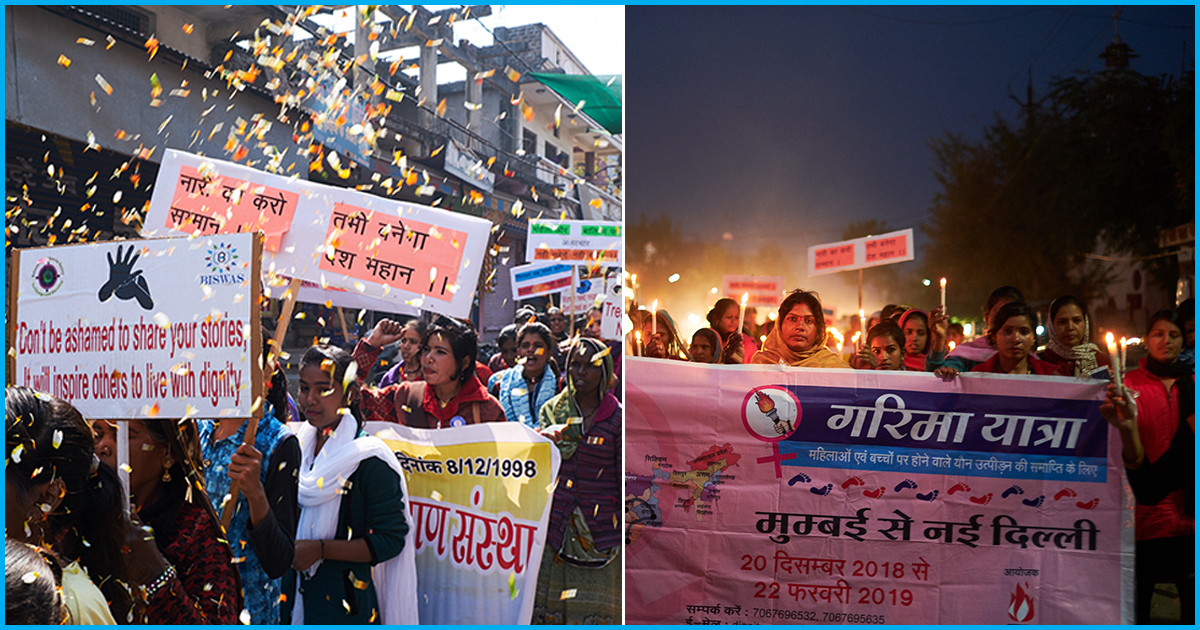
Rape Survivors From All Over The Country Undertake 10,000 KM 'Dignity March'
20 Feb 2019 5:04 AM GMT
Thousands of women including many rape and trafficking survivors from all around the country are on their 10,000-kilometre long march covering 200 districts of 24 states in India. The long march, called the ‘Garima Yatra’ or ‘Dignity March’ is to celebrate the ‘Yatra’ (Journey) of those undaunted rape survivors, who have been subjected to humiliation and banishment from the society. On Tuesday, February 19, the yatra that started two months back from Mumbai reached Meerut, in Uttar Pradesh. The yatra that was not just joined by the survivors, but many lawyers, activists, actors and politicians also came forward to support it.
The yatra for dignity
The victims of these heinous crimes have to spend their lives fighting legal and medical battles, but the worst is that even after that this, the victims remain at the receiving end of the hate and humiliation from the society. So with the aim to change the mindset of the people about the rape survivor, many organisations under the banner of Rashtriya Garima Abhiyan came forward to start this yatra on December 20.

The convenor of Rashtriya Garima Abhiyan, Ashif Shaikh who has been working for the rape, gangrape and trafficking victims for the last ten years told The Logical Indian that yatra is to let these women talk about their story in front of many people that will help the society to change their perception about rape survivors.
“In the last ten years, we have worked with almost survivors of 11,000 rape cases. Our support for the survivors has been on various levels. We help them to file the proper case against the perpetrators. We also make sure that there is a proper medical examination of the victim. Because, in India when the police send the rape survivor to the hospital to get the examination done, their main objective remains to get the evidence of the rape. Our third objective remains that the victim should get proper justice,” he said.
Bigger challenge of banishment
While explaining, how in many incidents the case is not properly chargesheeted he said, “In most cases, the victim does not even know what charges should be put against the perpetrator. Like if a Dalit woman is raped then the sections of SC/ST Prevention Act has to be put, then in case if a minor, sections of POSCO Act has to be put. But, in India, there have been times, when even if a woman is raped, only charges of assault are put against the accused. Or if a Dalit woman is raped then in the chargesheet charges of only abuse verbal against the women are put, in order to make a weak case. That is why we make sure that the police is putting proper charges against the perpetrator. Apart from this our organisation also tries to provide counselling for the victims.” However, he says that other than all these problems there is a bigger challenge that a rape survivor has to face.

He adds that to fight the legal, institutional battle, others can help the survivors. But to fight the social boycott or abandonment from their family and society the external help can do very little, which is why a ‘yatra’ like this will give these survivors courage to speak their heart out and reclaim their identity. Giving a reason behind this social boycott, he said that it happens because after such incidents with the victims the family treats them as untouchable.
While sharing several anecdotes with us from the meeting — took place last year with at least 2000 rape survivors to understand the problem faced by the victims — Shaikh said that in the meeting a 45-year-old rape survivor told the gathering that her husband has not even touched her for the last ten years because she was raped, and he thinks that she is an untouchable now.
A mother whose 14-year-old girl was raped also attended the event. The mother lamented that her entire family has boycotted the girl. She said that the family is least interested in fighting the case, all they want is to get her to get married so that they can get away with her.
Don’t hide, speak out
Shaikh says that according to the law, one should not reveal the identity of any rape survivor. However, he says this will not change the damage done to them. He added that in our society, rape is considered to be the fault of the victims, so if the survivor chooses to come out and make thousands of people listen to their story then that might change people’s perspective towards the victim.

Just a few days back when the ‘yatra’ was at the Ratlam district in Madhya Pradesh, many rape survivors were narrating their stories. At that time, a very prominent person from the village objected to the use of the word Balatkar (rape) being used at the event by the survivors, told Shaikh.
“In our country, there is a section of society that is fine with the act of rape. They know it exists it but they do not want to hear the victims talking about it. I believe hiding it won’t solve the problem but talk about it will.”
The ‘yatra’ that will culminate in Delhi on February 22, is being supported by almost 25,000 rape survivors, who are travelling from all across the country. Calling it a historic movement, Shaikh says, this is the first time when rape survivors on such a large scale are coming together to speak about their journey.”

According to him, over three lakh people including the family of the saviours and many volunteers have taken parts in this yatra. “We aim that by this yatra our will spread that message that survivors do not require any shame but they need your support. And, stop giving support to the perpetrator, rather shame them. Why should a girl or a woman have to be scared of telling the people about the assault that has happened to her? It is not that she has done something wrong. So, there should be no shame for her,” said 37-year-old Shaikh.
Success came by support
While talking about the success of the yatra, Shaikh said that his yatra is helping the people to break the myth about the clothes, age and nature of the survivor, as stories from women of a different religion, age groups are coming up.
“In our yatra, there are minors who were raped while there were wearing burkas, there is another 60-year-old who was raped by three policemen when she was in prison. Also, the mothers of 3-year-old who also was at the receiving end of the crime. Their stories would definitely help the people to change the narrative and it will break many myths. Also, it will give survivors more courage and strength.”

He also believes that the 65-day long yatra was a success in bridging the caste barrier. “As when we were planning this Abhiyan, we thought that there would be many Dalit and even upper caste women, which might bring discrimination, but this did not happen. We saw women from across religious and caste united because of the cause. In these so many days, we have lived together, slept and eaten together. But there was not a single problem.”
The convenor, Rashtriya Garima Abhiyan also told us that many lawyers, teachers, activist, actors and politicians also joined the yatra at different places. “We also went to IIT Kharagpur, IIM Madras and the student responses were also quite promising. In many colleges, many young men also opened up about their incident of sexual assault,” said Shaikh.
A little resistance
However, the coin has two sides, while the yatra was appreciated by many, some also said as they thought that it will spoil their villages image of their image. Shaikh said that over 80 lakh people participated in the yatra in some or the other way but there were times when some also refrained from participating in the yatra. He said when they went to the Bhanwari Devi, a rape survivor from Bhateri village in Rajasthan’s Bassi there was the ugly reality also in front of them. Among many, Bhanwari Devi, a rape survivor who was raped in 1992 by upper-caste men for trying to prevent the child marriage of the daughter of one of the accused was also at the yatra. It was after her public complaint that led to the formation of Vishakha guidelines to deal with sexual harassment in the workplace.
He told us that when the yatra reached to Bhanwari Devi village, Bhateri Jaipur district, to hold the event, not even a single person from the village which has a population of about 3000 people attended the event. Referring to Bhanwari Devi, Shaikh said that are people who have to spend all their lives fighting for justice. Who have to spend all these years just to explain to the people that what happened to them was not their fault.

Talking about the future of the Abhiyan he said that the yatra will culminate on February 22, but that day will start the process of change in the society. “We hope to start this Abhiyan more actively now as we have received a very supporting and welcoming response. We hope that in the next one year, the yatra that has gone to 200 districts will be able to help the rape survivor of that specific area.” In Indian 90- 95% of the population has faced sexual harassment in some or the other form, its just people do not want to speak about it. Only if people will start to talk about it only then teh things will change.
 All section
All section













